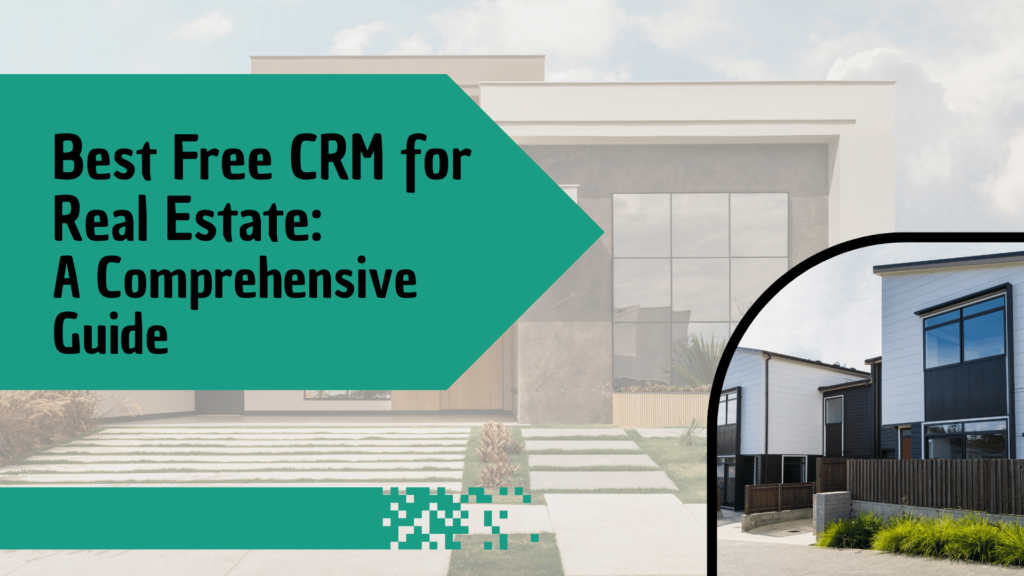Did you know that businesses using a CRM system experience a 29% increase in sales? In the competitive real estate market, where relationships are everything, adopting an effective Customer Relationship Management (CRM) system is more crucial than ever. With the right CRM, real estate professionals can streamline operations, enhance customer interactions, and ultimately drive sales.
This article aims to compare the top CRM solutions specifically tailored for real estate businesses, helping you make an informed decision on which tool best fits your unique needs.
Choosing the right CRM is pivotal for achieving business success. A well-implemented CRM can improve customer retention, optimize communication, and provide valuable insights into customer behavior. In a field where every relationship counts, having the right tools can set you apart from the competition.
We will explore key features, pricing structures, and ideal use cases for various CRM solutions, providing a comprehensive guide to the best free CRM for real estate. By the end of this article, you will have a clear understanding of which CRM system could best enhance your business operations.
What to Look for in a CRM for Your Business
Scalability
As your real estate business grows, so will your data and user demands. A CRM that can scale alongside your business is essential. Look for systems that offer flexibility in terms of features and user capacity, ensuring that your CRM can grow with you.
Ease of Use
An intuitive interface and straightforward onboarding process are critical, especially for small teams or those new to CRM systems. A complex CRM can hinder productivity and discourage team members from fully utilizing the system. Prioritize solutions that provide a user-friendly experience.
Customization
No two real estate businesses are alike, so a CRM should offer customizable features to adapt to your specific workflows and requirements. The ability to tailor fields, dashboards, and reports will allow you to better track and analyze customer interactions.
6 Best CRM Solutions for Real Estate
1. HubSpot CRM
HubSpot CRM is a popular customer relationship management platform designed for small to enterprise-level businesses. Known for its ease of use and scalability, it provides a wide range of features aimed at helping businesses grow, including marketing, sales, service, and content management tools.
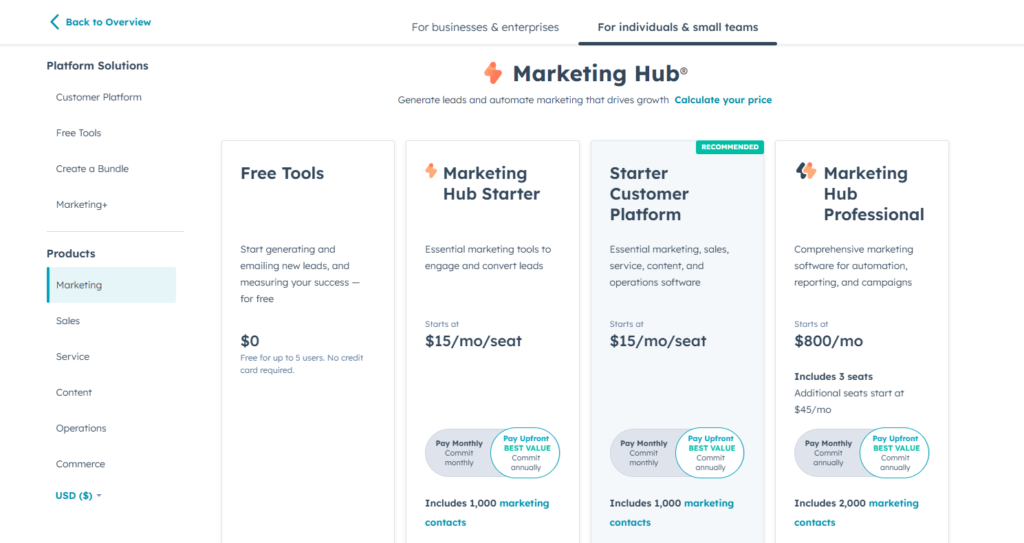
Key Features:
- Contact Management: Store and manage detailed contact information, leads, and communication history.
- Pipeline Management: Easily track deals and sales progress using a visual sales pipeline.
- Email Integration: Send, track, and log emails directly within the CRM to improve communication efficiency.
- Lead Scoring: Automatically score leads based on engagement to prioritize outreach efforts.
- Marketing Tools: Includes landing pages, email marketing, and lead generation forms.
- Mobile App: Manage your CRM on-the-go with a fully functional mobile app.
These features help real estate agents by organizing their lead pipeline, simplifying communication, and automating follow-ups, making it easier to close deals.
Pricing:
- Free Plan: $0 for core features, including contact and pipeline management.
- Starter: $15/month for more advanced features like email marketing and payment integration.
- Professional: $800/month, adding automation and advanced reporting.
- Enterprise: $3,600/month for top-tier features such as custom reporting, predictive lead scoring, and hierarchical team management.
HubSpot CRM is an excellent choice for real estate agents or small real estate teams looking for a free CRM that offers robust core features and an easy-to-use interface. The free plan is perfect for agents managing a few clients, while the paid plans are ideal for larger teams looking for advanced automation and reporting tools.
2. Zoho CRM
Zoho CRM is a powerful, flexible, and affordable customer relationship management platform. It offers a broad set of tools for businesses of all sizes, including sales automation, marketing, customer support, and analytics, making it a versatile choice for various industries, including real estate.
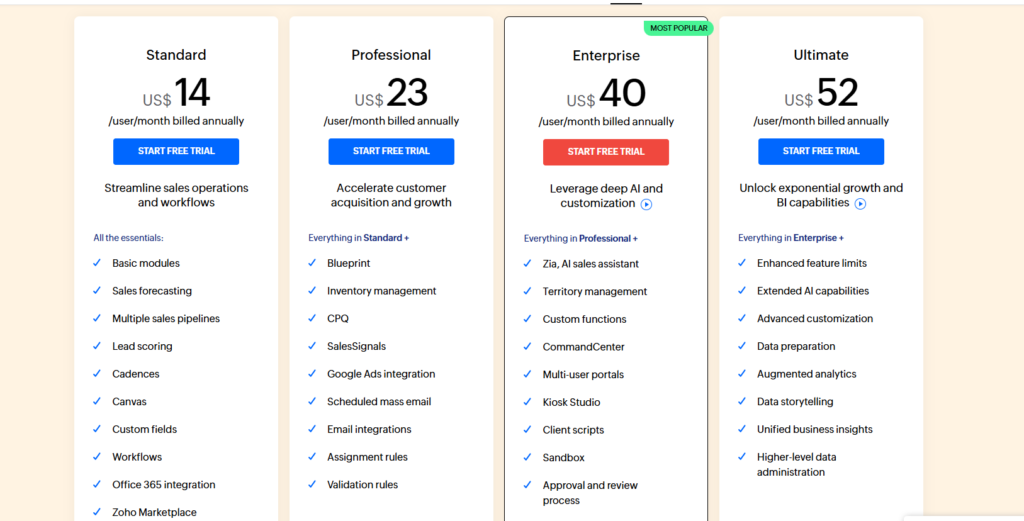
Key Features:
- Lead and Contact Management: Manage leads and contacts with ease, keeping track of every interaction.
- Sales Automation: Automate repetitive tasks like follow-up emails, lead nurturing, and reminders.
- Customization: Highly customizable fields, layouts, and workflows to match the needs of real estate agents.
- Mobile CRM: Full access to CRM features through a mobile app, helping agents manage their business while on the move.
- AI-Powered Assistant (Zia): AI tools that offer suggestions, detect anomalies, and automate key tasks.
- Third-Party Integrations: Seamless integration with other apps like Google Workspace, social media, and marketing tools, providing a comprehensive view of client relationships.
These features help real estate agents manage client interactions, automate lead follow-ups, and maintain communication across different platforms, all in one system.
Pricing:
- Free Plan: Supports up to 3 users with basic features like lead and contact management.
- Standard Plan: $14/user/month for more advanced features like workflows and integrations.
- Professional Plan: $23/user/month adds sales forecasting and email integration.
- Enterprise Plan: $40/user/month for advanced customization, AI features, and multi-user portals.
- Ultimate Plan: $52/user/month for premium features like advanced analytics and deeper customization.
Zoho CRM is ideal for real estate agents and small real estate teams seeking a free CRM with robust lead and contact management. The free plan is suitable for small operations, while affordable paid plans provide more advanced automation and customization for growing teams looking to scale their client management efficiently.
3. Pipedrive CRM
Pipedrive CRM is a highly visual, user-friendly platform designed primarily for sales teams. Its intuitive pipeline management and automation tools make it ideal for sales-driven businesses that need to focus on deal tracking and relationship management. It’s built to streamline sales processes, making it suitable for real estate agents who want to manage their deals efficiently.
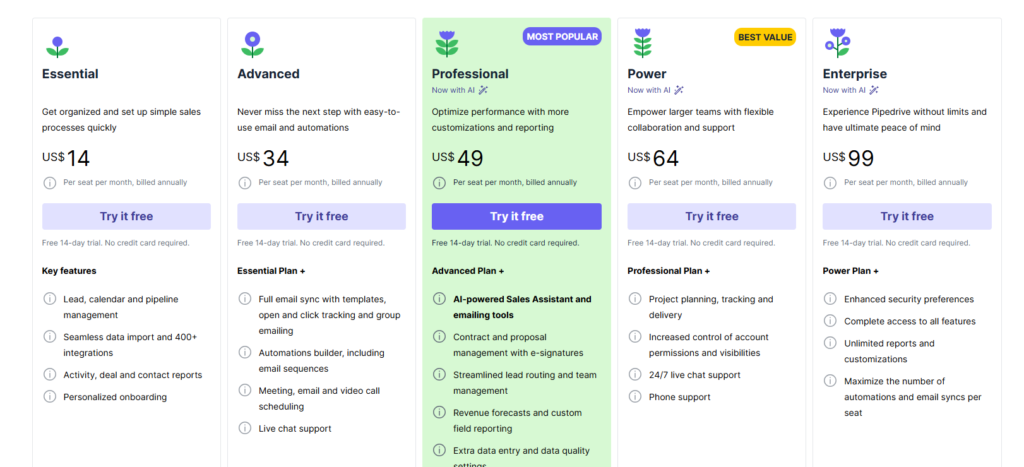
Key Features:
- Visual Sales Pipeline: Easily track deals and sales progress with a drag-and-drop pipeline.
- Lead and Deal Management: Organize and track leads, clients, and deals in one place.
- Email Integration: Two-way email sync allows real-time communication tracking within the CRM.
- Automation Tools: Automate repetitive tasks such as follow-up emails and activity scheduling to save time.
- Activity Tracking: Keep track of tasks and meetings, making sure no opportunities slip through the cracks.
- Mobile App: Manage your sales pipeline on the go with the mobile app.
These features help real estate agents stay organized, track client interactions, and close deals faster by automating tasks and streamlining communication.
Pricing:
- Essential Plan: $14/month per user for basic CRM tools like pipeline management and email integration.
- Advanced Plan: $34/month per user for full email sync, group emailing, and templates.
- Professional Plan: $49/month per user for advanced reporting, workflow automation, and call tracking.
- Power Plan: $64/month per user with advanced team management and task automation.
- Enterprise Plan: $99/month per user for extensive customization, security features, and premium support.
Pipedrive is great for real estate professionals who want a visual and easy-to-use CRM that focuses on deal tracking and automation. It’s best for those managing a large volume of deals and interactions, but not ideal for those seeking a free option, as it doesn’t offer a free plan. Its affordable paid plans make it a strong choice for real estate teams seeking growth.
4. Freshsales
Freshsales CRM, part of the Freshworks suite, is designed to enhance sales productivity through its intuitive features and AI capabilities. It provides businesses with tools to manage customer relationships effectively, streamline sales processes, and improve engagement with leads. Its AI assistant, Freddy, helps users predict sales outcomes and automate routine tasks, making it an attractive option for small to medium-sized businesses, especially in the real estate sector.
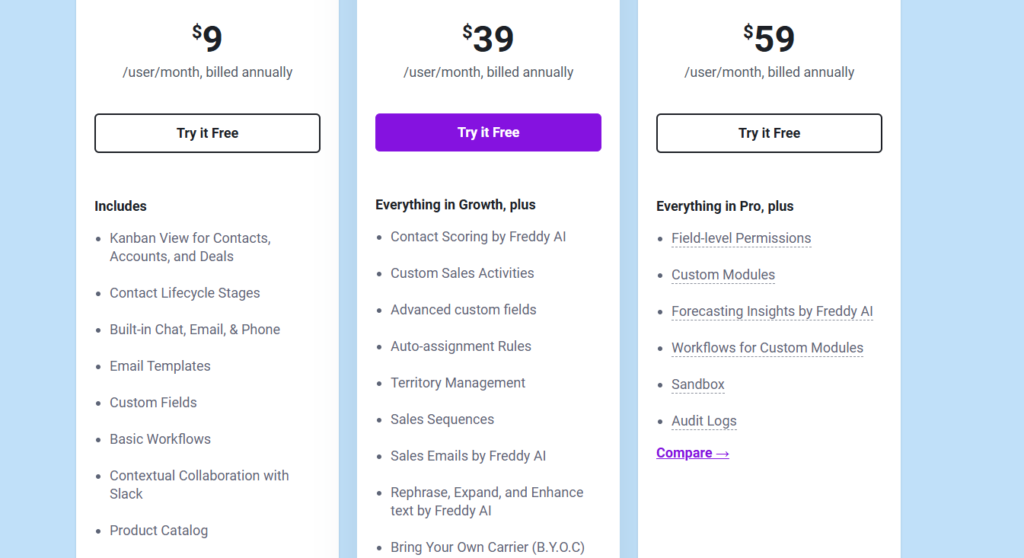
Key Features
- Freddy AI: Offers predictive analytics, lead scoring, and suggests next actions based on user interactions and historical data, enhancing decision-making capabilities.
- Contact Management: A comprehensive view of customer interactions, enabling users to track and manage relationships effectively. The system also automatically enriches contact profiles using available online data.
- Deal Management: Visual sales pipeline management that helps teams monitor deals and forecast revenue effectively.
- Cloud Telephony: Built-in VoIP capabilities allow users to make calls, manage call logs, and utilize advanced features like call recording.
- Email Automation: Enables bulk email campaigns with tracking features, helping users manage outreach efficiently.
- Reporting and Dashboards: Customizable reports and analytics dashboards provide insights into sales performance and help track key metrics.
- Mobile App: Allows access to CRM functionalities on the go, which is particularly beneficial for real estate agents working in the field.
Freshsales CRM is particularly beneficial for small to medium-sized real estate businesses looking for a cost-effective solution that offers essential CRM features combined with powerful automation tools. Its AI capabilities and robust pipeline management make it suitable for real estate agents who need to manage multiple leads and deals efficiently.
5. Nimble CRM
Nimble CRM is a relationship-focused customer relationship management tool designed primarily for small to medium-sized businesses. It emphasizes simplicity and social media integration, allowing users to manage and engage with contacts efficiently. Nimble stands out for its ability to pull in social media information and email interactions, creating a comprehensive view of customer relationships. This CRM is particularly useful for teams looking to enhance their engagement strategies and streamline their contact management processes.
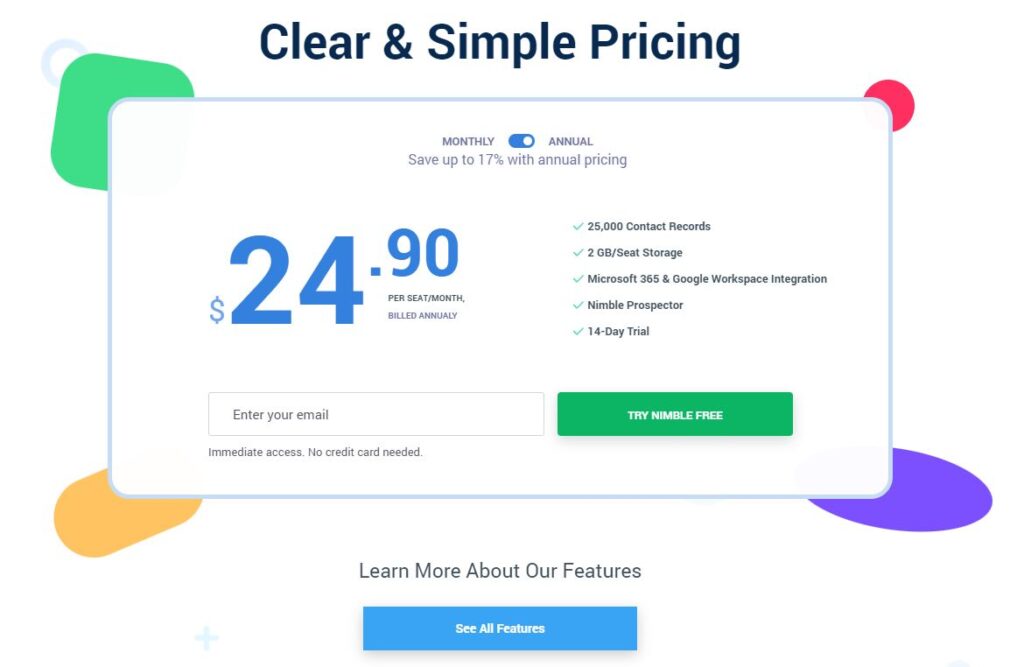
Key Features
- Nimble Prospector: This browser extension helps users gather information about contacts directly from web pages, social media, and emails. It enables quick addition of leads to Nimble and can update their details effortlessly.
- Social Media Integration: While recent changes have limited access to certain social media data, Nimble still provides valuable insights by scanning for publicly available information about contacts across platforms.
- Contact Management: Users can manage up to 25,000 contacts, with features for tracking interactions, setting reminders, and maintaining communication histories.
- Email Signature Capture: This feature allows users to automatically create and update contacts from email signatures, simplifying data entry.
- Task and Workflow Management: Nimble includes Kanban boards for managing tasks and workflows, making it easy to organize activities visually.
- Storage and Integration: Users get 2 GB of storage per user and can integrate Nimble with Microsoft 365 and Google Workspace, enhancing its utility for teams already using these platforms.
- Enrichment Credits: Users receive credits to gather additional contact details from websites, which can be crucial for expanding networks and managing leads effectively.
Nimble CRM is best suited for small to medium-sized real estate businesses that prioritize relationship management and social engagement. Its features facilitate effective lead tracking and customer interaction, making it an ideal choice for real estate agents and teams that rely on maintaining strong connections with clients.
6. Keap CRM
Keap, formerly known as Infusionsoft, is a comprehensive customer relationship management (CRM) platform tailored for small businesses. It combines CRM functionalities with robust marketing automation tools, making it ideal for businesses that want to streamline their sales and marketing efforts. Keap allows users to automate repetitive tasks, manage contacts efficiently, and create targeted marketing campaigns, providing a unified approach to managing customer relationships.
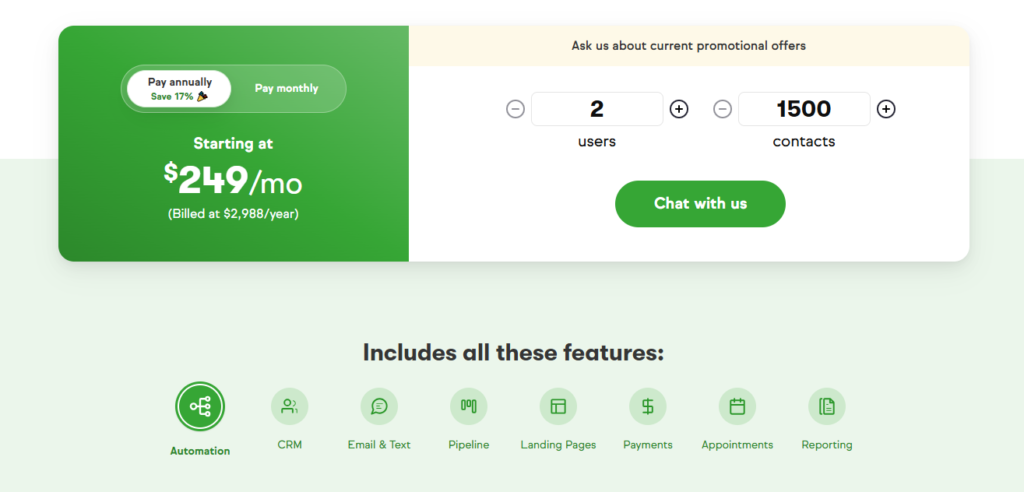
Key Features
- Sales Automation: Keap provides customizable automation templates for managing sales processes, allowing users to create workflows that streamline follow-ups and client communications.
- Integrated Email Marketing: The platform features a drag-and-drop email builder and automated email campaigns, enabling personalized outreach to leads based on their engagement.
- E-commerce Tools: Keap includes built-in payment processing and invoicing capabilities, allowing businesses to manage transactions directly within the CRM. Users can create forms, manage subscriptions, and handle recurring payments seamlessly.
- Lead Scoring: This feature helps prioritize leads based on engagement levels, enabling sales teams to focus on the most promising opportunities.
- Customizable Reporting and Analytics: Users can generate detailed reports on sales activities, campaign effectiveness, and other key metrics, helping them make informed decisions.
- Dedicated Business Line: Keap offers a business phone number for users in the U.S. and Canada, allowing them to manage professional communications separately from personal ones.
- Integration Capabilities: The CRM integrates with various tools and platforms, including Google Workspace, Microsoft 365, and Zapier, enhancing its functionality without requiring coding skills.
Pricing
Keap offers a pricing structure starting at $249 per month, which includes:
- 1,500 contacts
- 2 user seats
- Access to all core features including automation, e-commerce functions, and reporting tools.
Keap is particularly beneficial for real estate businesses that require an all-in-one CRM solution with strong marketing automation capabilities. Its ability to manage contacts, automate follow-ups, and handle transactions makes it ideal for real estate agents and teams looking to streamline their operations and enhance client relationships(
Which CRM is Best for Your Real Estate Business?
After careful consideration, HubSpot CRM emerges as the standout option for real estate professionals. Its combination of robust features, user-friendly interface, and scalability makes it an excellent choice for both beginners and seasoned agents.
Use Case Recommendations
- For New Agents: HubSpot CRM is ideal due to its free tier and ease of use.
- For Teams: Zoho CRM offers comprehensive team collaboration tools.
- For Advanced Users: Pipedrive provides advanced sales tracking capabilities.
Ready to elevate your real estate business? Start a free trial with the recommended CRM solutions or schedule a demo to see how they can meet your specific needs.
How to Choose a CRM: A Beginner’s Buying Guide for Real Estate
Step-by-Step Guidance
- Identify Your Business Needs
- Assess what features are critical for your operations, such as lead management, marketing automation, or customer support.
- Evaluate Features
- Compare CRM features against your needs, focusing on scalability, ease of use, and customization options.
- Consider Budget Constraints
- Determine your budget for a CRM solution. Many offer free tiers or trials, allowing you to explore before committing.
- Assess Customer Support
- Look into the customer support options available. A responsive support team can be invaluable when troubleshooting issues.
- Read Reviews and Testimonials
- Research user experiences to understand how well a CRM performs in real-world scenarios.
Conclusion
Selecting the right CRM is essential for enhancing your real estate business’s operations and customer relationships. Key considerations include scalability, ease of use, and customization features.
When choosing a CRM, consider your long-term business goals and how the system can scale with your needs. An effective CRM will not only streamline your operations but also foster stronger customer relationships.
Explore and compare the CRM options mentioned in this guide. Take the first step towards optimizing your customer relationships today!
FAQs
- Do I really need a CRM?
Absolutely! A CRM can help you manage relationships and streamline processes, which is essential for any real estate business. - How secure is my data in a CRM?
Most reputable CRM providers implement strong security measures, including data encryption and regular backups, to protect your information. - Can a CRM integrate with my existing tools?
Many CRM solutions offer integration capabilities with popular tools such as email marketing platforms, accounting software, and social media. - What is the cost of implementing a CRM system?
Costs vary widely depending on the provider and features. Many offer free tiers or trials to help you get started. - How long does it take to set up a CRM?
Setup times can range from a few hours to several weeks, depending on the complexity of your requirements and the size of your team.
This comprehensive guide positions Azizul Haque as a trusted CRM expert, providing valuable insights into selecting the best free CRM for real estate. The information is structured to facilitate easy navigation while ensuring that readers gain a thorough understanding of their options.
A seasoned professional specializing in CRM, SEO, and Social Media Marketing (SMM). With a deep understanding of customer relationship management, I help businesses optimize their digital strategies to enhance customer engagement and drive growth. Passionate about delivering measurable results through data-driven techniques and effective marketing solutions.
Let me know if you’d like any adjustments!

